Afghanistan War, Censorship, Civil Liberties, Climate Change, Criminalizing Dissent, FBI Intrusion, Habeas Corpus, Human Rights, Surveillance, Targeting Muslims, Torture, Truth to Power
Podcast: Play in new window | Download
Updates:
—————————–

Capitalism Hits the Fan: The Global Economic Meltdown and What to Do About It (THE BOOK)
Today we welcome back Rick Wolff, Professor of Economics at the University of Massachusetts to discuss his new book titled Capitalism Hits the Fan: The Global Economic Meltdown and What to Do About It. In his book, Rick takes the reader back to 2005 and step by step reveals how policies, economic structures and wage-to-profit systems led to a global economic collapse.
Rick Wolff will give us an update on why the media claims the recession is over, he also tells us if there be another leg down as predicted in the September 21st interview. Another leg down meaning, will the economy continue to drop? This was mentioned because of the way people were investing, investing in a way that expected the market to drop.
Rick Wolff:
- The origin of the economic crisis goes deep into history. It’s one of the key things that people don’t understand or want to face. Roots of a System’s Crisis
- We were a country founded by foreigners coming here, they got rid of the indigenous population. They established a mix system. Capitalism on one hand, with employers and employees, and then self employed farmers and small crafts people, and in the Southern US, slavery.
- When the dust cleared, capitalism came through, it destroyed slavery and suboridinated the self employed to be small and on the margins.
- For 150 years – 1820-1970 the growth of capital was outrunning the available labor supply. Laborers had options, could go West.
- For 150 years, the goods and services a person could buy from an hour of their wages kept going up. It produced a strange and unusual notion that you were blessed, if you worked hard you would make more money.
- That Americans could have a dream like that. . their children could have a better life and deliver on the promise.
- It drew millions of immigrants from all over the world etc.
- Then after the 1970s capitalism reminded us that it is not a guarantee that if you work hard you will be rewarded.
- In the last 30 years wages have not anymore gone up. It’s a sea change in our culture’s history.
- Wages stayed the same for these reasons:
- The arrival of the computer that substituted people for machines on a mammoth scale
- The movement of corporations to other parts of the world to take advantage of cheaper labor.
- Women and immigrants moving into the paid labor force. This plunged the US economy into a disaster zone.
- The end of rising wages. Americans today work 20 percent more hours a week, than their counterparts in France, Germany or Italy. They are exhausted physically. The families are in disarray.
- Then to consume more, live the American dream, they borrowed on credit, the likes of which no working class in the history of the world has ever done.
- The average debt of US family in the 1920s equaled about 1/3 of its annual income. In 2007, the level of debt equaled 125 percent of annual income. At the same time, the last 30 years have been greatest boom of profitability of American corporations.
- Where did the money come from to lend unprecedented amounts? The money came from the boom in profits made possible by there no longer being a rise in wages. You not only get the profitability of a flat wage situation but you get the added income from the interest that comes from lending.
- The reforms and regulations we’ve seen, don’t work. The only thing that got Americans working again after a 10 year depression – 1929-1939, was not economic reform and regulation, it was something called WWII.
- Corporations used their profits to weaken reform laws, buy politicians, create army of Lobbyists.
- The American people MUST demand different responses to this crisis than what there was in the past.
- Handing corporations the citizen’s tax money as bail out is folly.
- We have 15 million adults looking for work, 10 million more are discouraged and have given up.
- The first thing this government should do is provide work for the unemployed.
- Not bailing out the banks. The private sector has failed in the United States.
- The government should support enterprises that workers run them, form them as their own enterprises in a collective way that is different from capitalist corporations
- Let workers choose if they want to work for an enterprise run by workers or capitalists. Let us as consumers choose from good and services produced in a non-capitalist way alongside the capitalist.
Guest – Rick Wolff, Professor of Economics at University of Massachusetts at Amherst. In his new book Capitalism Hits the Fan: The Global Economic Meltdown and What to Do About, Rick takes the reader back to 2005 and step by step reveals how policies, economic structures and wage to profit systems led to a global economic collapse.
—–


Amy Goodman: Breaking the Sound Barrier.
Today, we’re very pleased to talk with award-winning investigative journalist and syndicated columnist, author and the host/executive producer of Democracy Now! Amy Goodman. Her new book titled Breaking the Sound Barrier is a collection of wide-ranging articles reminding the reader of what true independent journalism can do. Amy’s style of journalism breaks through the corporate media noise with stories from community organizers in New Orleans to the brave soldiers resisting war in Iraq and Afghanistan. Truthout
Author and journalist Chris Hedges writes : “Amy Goodman is one of the most important voices in America. She defies the noise and clamor of celebrity gossip. She challenges the manipulation of information and dissemination of lies by the power elite. She refuses to pander to a culture where news is seen as another form of entertainment designed to bolster corporate profits. She holds steadfast to the core values of our trade. Her integrity and honesty remind us that a culture that cannot distinguish between illusion and reality dies.”
Amy Goodman:
- Picasso’s famous anti-war painting Guernica in front of the UN Security Council. When Colin Powell went to the UN and they had a press conference, this painting was the backdrop and so they shrouded it in a blue curtain. We have to rip that shroud every which way, we have to tear it, because that’s what journalism is all about.
- Most of the voices in these columns are the people we interview on Democracy Now. The media is ahistoric, it whites out history. How are young people supposed to figure out what to do when they have no sense of what came before? What are the models, what works, what doesn’t work?
- Look at the money shifting from those who least have it to those who most have it, whether we’re talking about the economic meltdown. Obama surrounding himself by the Goldman Sachs folks.
- The model of community organizing has to be adopted by people all over the country.
- It’s not going to happen because there’s one person in the white house.
- The people with money and power walking the halls of the west wing, whispering in the commander in chief’s ear, and he says, if I do that, they will storm the Bastille.
- If there’s no one out there that he’s pointing at, we’re all in very big trouble.
- Breaking the Sound Barrier is the name of the column I do every week and the column appears in more than a hundred newspapers around the country. I think it is very important for people who consider themselves activists in this country hold their leaders accountable.
- It’s the right for people to conduct their lives in this country without being spied on or infiltrated.
Guest – Amy Goodman, host and executive producer of Democracy Now!, a national, daily, independent, award-winning news program airing on over 800 TV and radio stations in North America. Time Magazine named Democracy Now! its “Pick of the Podcasts,” along with NBC’s Meet the Press.
Goodman is the first journalist to receive the Right Livelihood Award, widely known as the ‘Alternative Nobel Prize’ for “developing an innovative model of truly independent grassroots political journalism that brings to millions of people the alternative voices that are often excluded by the mainstream media.” She is also one of the the first recipients, along with Salon.com blogger Glenn Greenwald, of the Park Center for Independent Media’s Izzy Award, named for the great muckraking journalist I.F. Stone.
—————————————————————-
Afghanistan War, Civil Liberties, Criminalizing Dissent, FBI Intrusion, Habeas Corpus, Human Rights, Surveillance, Targeting Muslims, Torture, Truth to Power
Podcast: Play in new window | Download
Listen to Law and Disorder live Monday November 9 at 9:00AM EST WBAI 99.5 FM: At 9:30 AM Michael Ratner Interviews Democracy Now’s Amy Goodman on her new book Breaking the Sound Barrier – Based on her columns for King Features Syndicate, this wide-ranging new collection of articles breaks through the corporate media’s lies, sound-bites, and silence. In place of the usual suspects— the “experts” who, in Goodman’s words, “know so little about so much, explain the world to us, and get it so wrong”
Updates:
Michael Ratner Update: Congress Should Not Reject Goldstone Report
—–

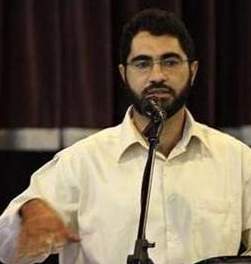
FBI Threaten Deportation To Muslim Man Refusing To Be Secret Informant
It was in 2004, that the FBI began to apply intense pressure on Foad Farahi to become a secret informant and spy on members of his mosque. Farahi, an Imam in Miami Florida refused. As many listeners may know, an imam is among the designated leaders in a community or mosque who leads prayers during gatherings and helps others understand the teachings of Islam. The FBI saw Farahi to be in a unique position to know local Muslim men. Farahi had met several South Floridians who allegedly had links to terrorism, including Jose Padilla.
Farahi refused to become a secret informant and the FBI knew he was in a vulnerable position. His student visa expired and he had applied for political asylum that could allow him to stay in the U.S. indefinitely. More than 2 years had past and in 2007, two agents showed up again asking Farahi to become an informant, he refused. In late 2007 Farahi was at a routine hearing for his political asylum case when he was told by his attorney that the ICE has a file with evidence that he is involved with a terrorist case. He was later presented with an ultimatum to drop the asylum case and leave the United States voluntarily, or be charged as a terrorist. Farahi agreed to voluntarily leave the US, but his passport expired, that gave him a little more time, and he later realized the government was bluffing and then hired attorney Ira Kurzban, a well-known advocate for immigrants’ rights.
(Law and Disorder archive Targeting Muslims Page 1 / Page 2)
Kurzban asked the Board of Immigration Appeals to throw out Farahi’s voluntary departure order, they refused. The legal battle has put Farahi’s immigration status in limbo. Kurzban told the Miami Times quote I think the real issue is, does the government have the right to pressure people… to make them informants?” —- “It’s clearly modus operandi of the FBI to recruit people who are going to be informants and to use whatever leverage they can.”
Ira Kurzban:
- Foad as an Imam, did not want to spy on others, but said to the FBI he would help them anyway he could.
- He was then put into removal (deportation) proceedings.
- The guilt by association method that the FBI has been using as an intimidation tactic is very reminiscent of the McCarthy period.
- The judge who originally denied Foad’s hearing was dismissed.
- We are now at the 11th Circuit of Appeals and an oral argument has been set.
- Immigrantslist.org – Political Action Committee
- This case represents a much broader pattern by the FBI and the government in trying to intimidate people into working as informants.
- They’re desperate to get informants but they’re using upstanding citizens to do bad things.
- The tragedy is that they’re turning people who are friendly to the United States into enemies.
Guest – Attorney Ira Kurzban, an adjunct faculty member in Immigration and Nationality Law at the University of Miami School of Law and Nova Southeastern University School of Law and has lectured and published extensively in the field of immigration law, including articles in the Harvard Law Review, San Diego Law Review and other publications.
——–



Michael Steven Smith – In Memory of Bob Boehm, Center for Constitutional Rights Vice President
On the recent eighth anniversary of the events of September 11th, our own Michael Steven Smith, draws a balance sheet on the state of democratic rights in America. He spoke to a captive audience on the long standing Five Towns Forum on Long Island in honor of recently deceased Center for Constitutional Rights Vice President Bob Boehm.
——-
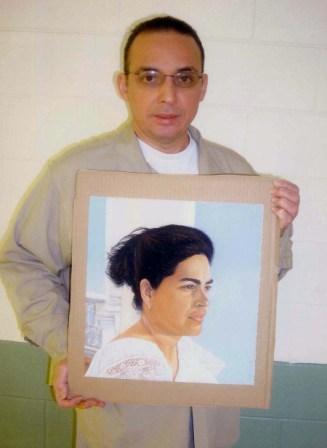
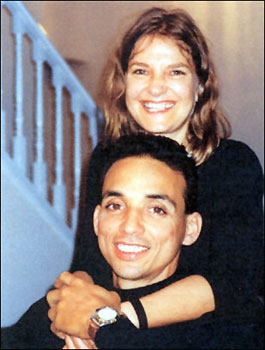
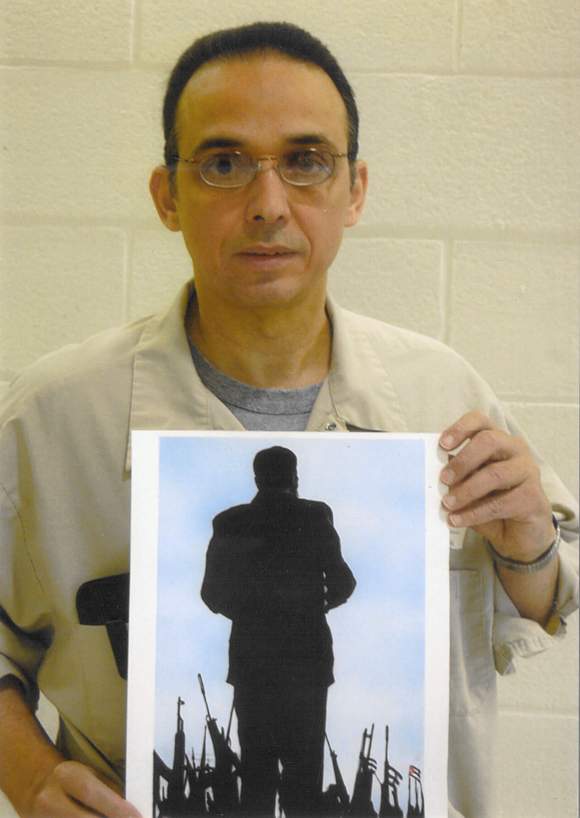
Cuban Five Update: The Re-sentencing of Antonio Guerrero
Earlier this month, Federal Judge Joan A Lenardo replaced the life sentence for Antonio Guerrero, one of the Cuban Five. Mr. Guerrero, a United States citizen, was convicted of spying for Cuba while working at the Naval Air Station in Key West. His sentence was reduced to almost 22 years, which means he could be out of prison in nearly seven years. Mr Guerrero’s attorneys had asked for the sentence to be reduced to 240 months, but Judge Lenardo set it at 262 months.
Mr. Guerrero’s lawyer, Len Weinglass told the New York Times, it was an odd decision, he said “You have a man who was on a military base but who didn’t take a single classified document and no one testified that he injured U.S. national security, but the judge still rejects the prosecutors’ request to lighten the sentence.” Transcript of Hearing
Len Weinglass:
- Antonio Guerrero who I represent, was originally sentenced to life in prison.
- The appellate courts reduced the life sentence for the conspiracy to commit espionage against 3 of the Cuban Five
- The decision only remanded life sentences for ultimately 2 of the Cuban Five including Antonio Guerrero
- We returned to Miami for the re-sentencing on October 13. Prior to the re-sentencing, we negotiated with the government on the issue of re-sentencing alone, making it clear there was no admission of guilt on the underlying charge, which we are still contesting on a later collateral attack.
- We agreed that it should come down from a life sentence to a period of 20 years.
- In Miami, the judge took the very unusual step of setting the agreement aside, and set the term to 21 years and 10 months.
- You can’t give a life sentence ( in this case) on what they intended to get, you can only give a life sentence on top secret information they did get. So, the original life sentence was wrong.
- When we got into the re-sentencing hearing, she got back to her original position as if the appellate court hadn’t ruled.
- I got very upset, the courtroom was packed. Packed with the same old crowd. The crowd in Miami that backs these para-miltary forces, they put the widows up front.
- I got upset at what I sought to be a climate that was being generated in that hearing and so I reminded the judge very forcibly that she was sentencing an individual not a country.
- I had given the court government documents from the Bureau of Prisons, all of them saying that Antonio Guerrero who was serving a faulty life sentence, and sent to a maxium security prison, which he shouldn’t have been sent, because the sentence was wrong.
- But the warden, his counselor and the supervisor of the unit, all extolled his behavior and most significantly pointed out that he had helped save a number of inmates all of whom were doing life sentences, from an encouragable future, by training them in English and Math and overseeing them getting their GED.
- At that time, she was about to pronounce sentence, then she stopped, walked off the bench.
- When the judge came back, the first thing she did is recite a Supreme Court decision, all federal judges must sentence an individual according to his character.
- Antonio was 39 when he was arrested and he will be nearly 60 when he is released. That’s the heart of a lifetime.
- There was no acknowledgment of context here. That this was provoked by a pattern of violence by the US directed at Cuba. Where more than 3000 people have died in the past 40 years from violence coming from Southern Florida.
- The Cuban Five performed their task, nobody was harmed, no property damaged and they end up with life sentences for that operation.
- It came to light that the federal government was paying members of the press in Miami as part of their anti-Castro campaign to write articles about this case that were highly prejudicial. People who were reporters but were on the federal payroll.
- Can the government be responsible for creating a prejudicial atmosphere?
- He was at the most hard-nosed prison and after seven years the warden of that prison wrote the Regional Bureau of Prisons, asking that Antonio be released from that prison. He doesn’t belong, there, he is a lovely sensitive man.
Guest – Attorney Len Weinglass, who represented the Cuban Five, as William Kunstler’s younger partner, Len Weinglass was considered the work horse of the defense team. He’s worked on a number of political cases including the Pentagon Papers trial and the Angela Davis case. He’s a Yale Law School graduate and former U.S. Air Force Captain.
—————————————————————————————————————-
Afghanistan War, CIA Sponsored Terror, Civil Liberties, FBI Intrusion, Guantanamo, Habeas Corpus, Human Rights, Surveillance, Targeting Muslims, Torture, Truth to Power
Podcast: Play in new window | Download
Updates:
———
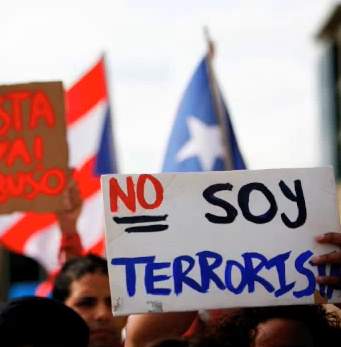

Historic Strike – Privatizing Puerto Rico; Bar Association Dismantled.
Public services grinded to a halt on October 15 in Puerto Rico as a massive one day general strike brought more than 100 thousand people to protest the lay off of about 17 thousand of Puerto Rico’s public employees. The demonstration shut down all state-owned enterprises including the island’s schools and colleges. The airport remained opened, while tens of thousands were reported to converge on San Juan’s Plaza Las Americas.
Main labor organizations, the General Workers Union and the All Puerto Rico for Puerto Rico Coaltion supported the general strike. In May of this year, the Puerto Rican government laid off nearly 8 thousand employees and then hired about 3 thousand temporary teachers and assistants. Union leaders claim that Governor Luis Fortuno is planning to privatize government services. Outrage to the proposed layoffs have rippled into New York City, amid second largest community of Puerto Rican people.
Attorney Judith Berkan:
- Public worker dismissals at almost 25 thousand.
- Any agencies who deal in service to the poor or working class in Puerto Rico
- Two days before the strike, the governor signed and passed a bill aimed at dismantling the Bar Association
- After the massive first strike there have been daily strikes
- They want to return us to the days of the Oligarchy, concentrating wealth into the hands of a few while the remainders pick up the crumbs
- Protesters: Students from every university, every sector of the labor movement, the religious sector, cultural organizations, 700 school principals.
- There were 2000 janitors in the schools, right now there are no janitors in the schools of Puerto Rico and that’s going to be privatized.
- Two thousand school janitors were fired in the middle of the swine flu scare. The government plans to put these jobs out to bid for private companies.
- The atitude is . . . we’re doing this and the rest of you be damned.
- Puerto Rican government: Marcus Rodriguez Ema brought in again whose forte has always been privatization. He said on a radio station that if there was any blockage of commerce that it could be brought under the Patriot Act. He said that they are terrorists and they’re trying to block commerce.
- The way they framed it, if you stop commerce, particularly, the docks and the airports, that would be sanctionable under federal law.
- There have been a number of very offensive comments by the people in charge. Calling community leaders leeches, lowlifes, openly.
- The legislation has cut off funding for the Bar Association in Puerto Rico.
- I think the militancy will continue, we have not seen the last of general strikes here.
Guest – Attorney Judith Berkan, is a partner in the San Juan law firm of Berkan/Mendez. She specializes in government misconduct litigation and employment discrimination cases. Berkan worked as an attorney in New Haven, Connecticut before going to Puerto Rico as the staff attorney for the Puerto Rico Legal Project of the National Lawyers Guild, now the Puerto Rico Civil Rights Institute. For twenty-seven years, she has been teaching, primarily in the Constitutional Law area, at the Inter American University Law School in San Juan, Puerto Rico.
A frequent speaker and author of many articles on civil rights issues, she was the President of the Human Rights Commission of the Puerto Rico Bar Association in the mid-1990’s and a member of the Commonwealth Supreme Court’s task force on gender discrimination.
——–


Guantanamo Update: 223 people left in Guantanamo, 97 are Yemeni.
Alla Ali Bin Ahmed was among the 98 remaining Yemeni prisoners let go from Guantanamo Bay prison. In May of this year, a judge reviewed the government’s classified evidence again Ahmed, and ruled that his incarceration had never been justified. Never been justified? Yet, he remained like many Yemenis in Guantanamo Prison. Earlier this year, the Center for Constitutional Rights called for all Yemeni detainees to be released and repatriated. In a media statement, CCR attorney Pardiss Kabriaei, said ” More than one-third of the prisoners at Guantanamo right now are from Yemen. Most have been detained without any charge and in brutal conditions for over six years. It is unacceptable that the Yemeni and U.S. governments have not come to an agreement to bring these men home. There is absolutely nothing which should prevent their return to Yemen.” Law and Disorder March 2009 Interview with Pardiss
Attorney Pardiss Kebriaei:
- This is the part of Guantanamo that is about accountability.
- A case filed in 2008 on behalf of 2 men that died in Guantanamo on June 2006
- We brought this case against 20 officials, including Rumsfeld and Michael Leonard, Jeffrey Miller, people who were in charge of and approved torture techniques.
- U.S. Army General Bantz John Craddock who introduced a policy of force feeding in Guantanamo whereby detainees are literally strapped into chairs that are called restraint chairs, strapped in at five points, while a tube is forced up their nose and down their stomachs and formula is pumped into them for about an hour
- also named are physicans who knew by virtue of reports from the Red Cross.
- Center for Constitutional Rights – When Healers Harm – A focus on the accountability of medical personnel in Guantanamo who have a professional duty and oath to protect the health and well-being of men.
- It took 2 years for the military to conduct its investigation of these suicides.
- We filed Monday Oct 6, a motion to dismiss, they want to get rid of the case essentially, under the point that reporting claims of abuse are barred under the Military Commissions Act of 2006
- There is a provision in it Section 7, we’re challenging the constitutionality of that provision, the provision in the Military Commissions Act of 2006, that prevents detainees to bring lawsuits against the United States, the first time this MCA, has been asserted, now under the Obama Administration.
- Mohammed al Qahtani video tapes documents the torture he was experiencing, forced nudity, prolonged solitary confinement, using dogs and sexual abuse. Those are the methods that were approved by Donald Rumsfeld in 2002
- January deadline to close Guantanamo is not going to be met, according to US Attorney Gen. Holder
- 223 people left in Guantanamo, 97 are Yemeni.
- Federal judges have ruled on some 30 cases, that there is no lawful basis to hold them, yet of 30, 19 remain in Guantanamo. (Kuwaitis / Yemenis)
- Not the worst of the worst left in Guantanamo, it is nationality.
- There are innocent people who have been in prison for 8 years, it’s not a solution to sit back any longer.
- Guantanamo may stay open a few months past January and then transfer prisoners to the US.
Guest – Pardiss Kebriaei, Staff Attorney with the Guantanamo Global Justice Initiative, at the Center For Constitutional Rights.
—————————————————————————
Civil Liberties, Criminalizing Dissent, FBI Intrusion, Habeas Corpus, Human Rights, Supreme Court, Surveillance, Truth to Power
Podcast: Play in new window | Download
Host Updates:
———————————————

Gaza Update: Code Pink Member Kitt Kittredge
Last month, the United Nations commission released the Goldstone Report, a scathing six hundred page account detailing how Israel committed war crimes against the Palestinians in the Gaza Strip. South African Judge Richard Goldstone who headed the report says the Israeli Defense Force and Israeli commanders must stand trial for war crimes committed during Operation Cast Lead earlier this year. Recently, Israeli Prime Minister Benjamin Netanyahu said he would never allow any Israel’s leaders or soldiers to be put on trial for war crimes. He called the Goldstone report a kangaroo court against Israel. War crimes are war crimes as many see it.
Meanwhile, living conditions in the Gaza Strip deteriorate, salt water has contaminated a large percentage of drinking water, damaging kidney function among the Palestinian children. Many who can afford it are trying to leave the region. To give us an update on the living conditions, we catch up with Code Pink member Kitt Kittredge, who has recently returned from Gaza.
Kitt Kittredge:
- It turned my stomach to think that we were handing off a less better world to our children
- So I thought I should step into the more active role of a concerned citizen and I found Code Pink.
- The conditions are deteriorating, it is a place under siege as you know, I consider it a very slow, deliberate strangulation of Palestine. Because it is a slow strangulation, it doesn’t make the news as would a total annihilation
- The biggest thing is they’re demoralized, depressed and diminished sense of hope.
- Unemployment is up more than it was in March, and women are bearing the burden of that.
- Goods are less available, and they are extremely expensive, Israel determines what goes in and when.
- Less than 15 percent of what is really needed.
- The water out of the tap is salty, the showers are cold. The salt water is coming into the wells, the desalinization plant was destroyed, and now the children are drinking the salt water, and they have severe kidney damage.
- It was very exciting to go to Gaza in September and work with the Palestinians on the Gaza Freedom March scheduled for December 31, 2009
- International Surge To End the Siege – GazaFreedomMarch.org
Guest – Kitt Kittredge – Code Pink member, recently returned from the Gaza Strip.
———–


Decriminalization of Drug Possession
Decriminalization of drug possession has now gone into effect for 150 million Latin Americans. Earlier this month, Mexico decriminalized the possession of a small amount of all drugs and days later, the Argentine Supreme Court declared unconstitutional their own law that criminalized drug possession. Embedded in the recent legislation, Mexico’s decriminalization laws also allow for state and local authorities to arrest and prosecute drug offenders and allows them to make undercover drug buys.
“What’s happened in Mexico and now Argentina is very consistent with the broader trend in Europe and Latin America in terms of decriminalizing small amounts of drugs and promoting alternatives to incarceration and a public health approach for people struggling with drug addiction,” said Ethan Nadelmann, executive director of the Drug Policy Alliance. International Drup Policy Reform Conference Nov 12 – 14, 2009.
Ethan Nadelmann:
- I think people understood that this was a good idea all along, sensible re-prioritization of police resources, treat addiction as a health issue, not a criminal issue.
- Many people who are getting away with drug possession don’t really have a drug problem and shouldn’t be a concern of the state.
- It doesn’t require people to be tossed into rehab regardless if whether or not they have a drug problem
- This applies to any drug (Mexico law)
- It’s part of that human rights, civil liberties tradition that exists in various languages in many parts of the world.
- Two thirds of Americans say, someone who’s been picked up on possession of drugs and clearly has an addiction, should not be sent to jail,
- More than 70 percent of the American people say that a small amount of marijuana possession should be decriminalized
- My job is to mentor and hand off the baton to the second and third generation,
- I look at drug policy reform as a movement for individual freedom and social justice
- New York City, marijuana arrest capital of the world / 40,000 marijuana arrests per year / Targeting young black and brown men
- Easy arrests, easy overtime pay, not contributing to public safety in any way even as its really screwing with hundreds and thousands of peoples lives.
Guest – Ethan Nadelmann, executive director of the Drug Policy Alliance says that the global consensus on drug policy is changing as countries seek to counteract prison overcrowding, rise in organized crime and drug violence.
——–
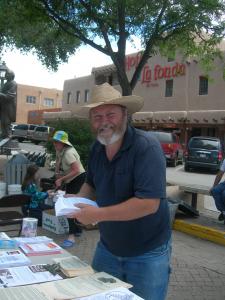


Food Not Bombs Surveillance: Criminalizing Lawful Non-violent Protest
Since 9/11, the government has stepped up its surveillance of a range of individuals and organizations, including volunteer-based groups. After providing free vegetarian food in hundreds of communities worldwide, Food Not Bombs has found itself a part of the domestic terrorism dragnet. Co-founded by Keith McHenry and seven friends, the group is dedicated to non-violent social change, and recovers food that would otherwise be discarded to serve hot free meals to the homeless, disaster survivors, rescue workers and others.
Keith McHenry – Food Not Bombs:
- We started out in Cambridge, MA. I was a produce worker and I was throwing out a lot of produce every morning. It occurred to us that we could take some of that produce and give it to battered women shelters and homeless shelters.
- We could also promote vegetarian eating and animal rights.
- We now share vegetarian meals in a thousand cities every week. We’re in Iceland, Poland has 12 chapters.
- I got arrested in 1988 for serving food without a permit. I ended up facing 25 to life under California’s 3 strikes law. They didn’t mind that we were feeding people, but we were making a political statement and that’s not allowed.
- Political Statement: Money and resources can go more toward feeding the hungry, healthcare and education. Diverting some of the money from the military to domestic human needs.
- Anonymous people would go to the state government, or city officials in different communities and file complaints against us.
- In Albuquerque, New Mexico, we started to get fined 500.00 a day, everyday we served, because of this anonymous complaint.
- We found out that it was military personnel who objected to our statement.
- In Flagstaff, Arizona, you can serve the food but you can’t have the Food Not Bombs banner and literature.
- Last week in Lancaster, Pennsylvania, similar complaints. Turned out the anonymous tipster was the manufacturer of landmines. This was a quarter mile away from where we were sharing free meals.
- A Lancaster health department official came by, without a thermometer to test the pH of the food, and said it was fine we were feeding people we had to get rid of the literature.
- We’re seeing this all over, including letters from the state of New Mexico, ordering me to stop all chapters serving free food.
- In Connecticut, I started getting emails ordering to stop all chapters.
- I think its the federal government, Homeland Security, and the intelligence unit of Chevron Oil, have all been involved in harrasing Food Not Bombs.
- We were first declared a terrorist organization in 1988.
- I’ve been under intense stress for a number of years, with informants trying to force me out of Food Not Bombs.
- I lost a couple of friends, who had committed suicide, as a result of this tension created in San Francisco, Food Not Bombs in particular.
- When I was facing the 3 strikes case in California, there was a man who turned out to be an FBI agent, was hanging out with my wife.
- He was hanging out at the California street bus stop, and he became friends with my wife, and ended up having an affair with her, during the time I was incarcerated and we had no idea whether I would get out of prison.
- Everything that we were saying in our house was being monitored.
- In one case, my home phone had become a pay phone. The Food Not Bombs hotline. To dial out, he was asked to deposit 35 cents. I would dial 611 Pacific Bell phone repair and they would tell me it was a pay phone.
- We’ve had a huge number of informants joining Food Not Bombs.
- When someone at a Food Not Bombs meeting is joking about violence, you have to distance yourself from that person. You don’t need to call them out and say you’re an infiltrator.
Guest – Keith McHenry, co-founder of Food Not Bombs. Keith has been arrested more than 100 times for making a political statement of sharing free food in San Francisco and he has spent more than 500 nights in jail for peaceful protest.
———————————————
CIA Sponsored Terror, Civil Liberties, Guantanamo, Habeas Corpus, Human Rights, Prosecution of the Bush Administration, Supreme Court, Surveillance, Targeting Muslims, Torture, Truth to Power
Podcast: Play in new window | Download
Host Updates:

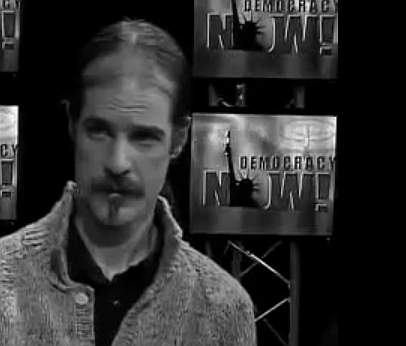
Elliot Madison: Activist Arrested for Using Twitter To Communicate With G20 Protesters.
Elliot Madison, a social worker and activist was arrested in Pittsburgh last month during the G20 Summit and was charged with hindering apprehension or prosecution, criminal use of a communication facility and possession of instruments of crime. The Pennsylvania State Police say he was found in a hotel room with police scanners and computers while using the social networking site Twitter to communicate police movements to protesters. Madison recently said “They arrested me for doing the same thing everybody else was doing, which was perfectly legal,” he said. “It was crucial for people to have the information we were sending.” Madison’s laywer Martin Stolar told the New York Times “He and a friend were part of a communications network among people protesting the G-20,” Mr. Madison’s lawyer, Martin Stolar, said. “There’s absolutely nothing that he’s done that should subject him to any criminal liability.”
Attorney Martin Stolar:
- It seems it would be helping out the police in a way. They’re saying disperse, don’t go here, don’t go there.
- They selected him for some reason amid all the various people posting things on twitter boards
- They got a search warrant for his hotel room, rousted he and a colleague who was there, arrested Elliot and he was held on a 30 thousand dollar bail.
- Unfortunately, agents of the FBI, and the Joint Terrorism Task Force, showed up at his home in Queens, with a search warrant issued by a Federal Court in Brooklyn, seeking evidence of violating the federal anti-rioting laws. (H.Rap Brown Act) Think about the Chicago 8.
- They spent 16 hours searching his home, grabbing everything in sight, it was terribly unclear what would violate this law. So they took pictures of Lenin, his writings, computers, material from producing a documentary film.
- The warrants seemed properly issued, until I can see the affidavits that underlie the warrant.
- I whipped up some legal papers to show cause and a motion under Federal rules of criminal procedure 41G. A motion for the return of property illegally seized.
- He is accused of posting stuff that is publicly available, that is a police scanner that is posted on the internet, such as a police order to disperse.
- That information is passed on through the Twitter board and that constitutes the crime that he is charged with.
- Law enforcement is targeting those who provide support for lawful demonstrations.
- This case is a first in Pennsylvania and a real stretch in criminal law to penalize what is essentially speech
- In New York, there is potentially a separate investigation in which Elliot is a target
- The so-called Green Revolution in Iran, the demonstrators were using Twitter, in exactly the same way the folks in the G20 used it. When the oppressive government came down on the Iranian students using Twitter, the US State Dept said, wait a minute there are free speech issues here.
Guest – Attorney Martin Stolar, president of the New York chapter of the National Lawyers Guild.
———


Supreme Court To Argue Life Without Parole Cases For Children
The Supreme Court will address whether it’s constitutional to sentence a child to be imprisoned for life without parole for an offense committed during adolescence. There will be two main cases the Supreme Court will argue. One is the case involving Joe Sullivan. Joe, at the time, was a mentally disabled 13 year old child living in a home where he was physically and sexually abused. He was convinced to participate in a burglary of a home. The elderly home owner was sexually abused, though she didn’t see her attacker. Joe was tried in an adult court, found guilty and sentenced to life in prison without the possibility of parole. He was fourteen when he was sent to an adult prison, there he was abused and later diagnosed with MS. That is a summary of one of the cases.
Professor Stephen Harper:
- 2400 Kids in jail serving life sentences without parole in the US. 120 of those kids didn’t commit homicides.
- The United States is the only country in the world that sentences children to life, without the possibility of parole
- Part of this sentencing of kids was an accident, they were getting tougher on adults in the early 80s and 90s.
- There should be an opportunity, Sullivan’s lawyer argued that at some point they could be granted parole
- Florida is the number one state that puts children in prison for life without the possibility of parole
Guest – Stephen Harper, Adjunct professor of Juvenile Justice University of Miami school of Law.
———————–
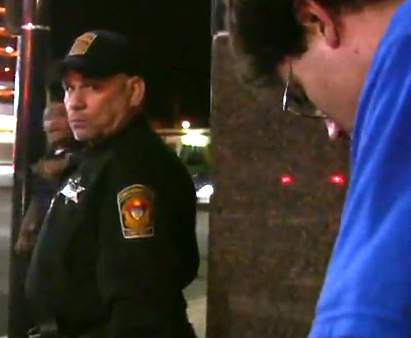
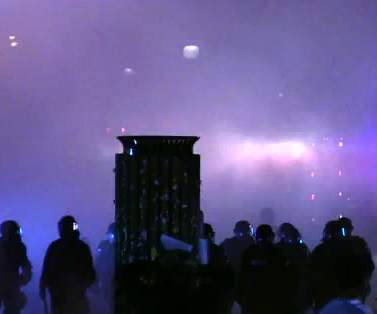
National Lawyers Guild Observes Improper Use of Force by Law Enforcement at the G-20
Many listeners have probably seen the videos of the G20 protesters going up against hundreds of riot police. Some of the most compelling footage were of reckless use of LRAD, the sonic weapons, and the surge of riot police onto the University of Pittsburgh campus. Many students who were not protesting were rounded up, knocked down, tear gassed and beaten by police. We reported last month on the blatant violations of first amendment rights as local police engaged in patterns of harassment on activists such as the group Seeds for Peace. Today we hear first hand accounts of police abuse from our own Heidi Boghosian who was at the marches and demonstrations as a legal observer and we’ll be joined by attorney Joel Kupferman, who was also at the also a legal observer with National Lawyers Guild at the G20 Summit. Read Heidi’s G20 Blog Entry Here
Heidi Boghosian / Joel Kupferman
- LRAD Sonic Weapons combined with order to disperse. You had to cover your ears, some stayed still, paralyzed. We think it’s illegal, it’s and invasion, it’s a weapon.
- One of the legal angles, we’re looking into is the fifth amendment, where we charged Christine Todd Whitman after 9/11 for violating our fifth amendment rights of bodily integrity and in this case, that sound pierced that bodily integrity.
- The manufacturer of the device (LRAD) filed in their SEC filings of Sept 2008 that the device is capable of sufficient acoustic output to cause damage to human hearing or human health, expressing concern that the misuse could lead to lawsuits.
- Private security police forces were employed. They went up the hill, onto the campus and students were just coming out of their dorms, hearing this noise, the helicopters, they didn’t know whether they should stay in their buildings. They started to arrest people who didn’t know what was going on.
- This is the highest police per protester ratio I’ve ever seen, definitely a radicalizing experience for these students, definitely no cause for arrests. Wantonly arresting people in a violent fashion.
- When we spoke to shop owners downtown, there was a hatred, I’ve never seen before. The sympathy came from the neighborhoods of color, it was a climate of fear, they were basically saying, you can’t assemble.
- It almost seemed like it was a police convention. The Pittsburgh Police Department wore military fatigues. I saw more Canine Units there then any other demonstration.
Guest – Attorney Joel Kupferman, National Lawyers Guild Legal Observer /New York Environmental Law and Justice Project
————————————————












